Gil Gerard, Star of ‘Buck Rogers,’ Dies at 82

© Donaldson Collection/Michael Ochs Archives, via Getty Images

© Donaldson Collection/Michael Ochs Archives, via Getty Images
© Win McNamee/Getty Images

中国和俄罗斯基于对等原则,先后于9月和12月试行彼此公民免签入境,直至明年9月。俄罗斯向中国游客免签之际,正值中日关系陷入僵局,被视为“日本平替”的俄罗斯,成为中国网民热议的旅游目的地。
然而,第一批免签前往俄罗斯的中国游客,对当地的旅游体验却是负评满满。
一篇题为《第一批免签去俄罗斯的中产,傻眼了》的网络文章,本周冲上微博热搜,并获得不少主流媒体转载。
中日关系因日本首相高市早苗涉台言论趋紧,美国驻中国大使馆人员前往清华大学台湾研究院交流台海形势。
清华大学台湾研究院星期二(12月16日)在微信公众号发文称,研究院院长巫永平教授,助理教授吴维旭、张遂新12月9日接待美国驻华大使馆政治处一等秘书黄东伟,双方就中央对台政策、近期台海形势和各自关心的问题交流了看法。
根据新闻稿,清华大学台湾研究院和美国驻华使馆政治处围绕台湾问题形成了良好的交流关系。
此外,澳大利亚驻华大使馆临时代办费致远(James Fisher)、二等秘书顾思灵(Elise Gruttner)也在11月27日赴清华大学台湾研究院开展交流。
新闻稿指出,双方就台湾问题、中澳关系以及当前国际形势进行了广泛深入的交流,并表达了未来进一步加强交流对话的意愿。
赴北京述职的香港特首李家超与在当地学习或工作的香港青年共进早餐时说,香港在创科领域与中国大陆城市的合作潜力很大,并鼓励他们多到大陆与香港学习先进技术,共同推动两地创科发展。
李家超星期三(12月17日)在脸书发文称,他当天早上与四名在北京学习或工作的香港青年共进早餐,这些青年均具创新科技领域背景。
李家超说,中国国家主席习近平在上周举行的中共中央经济工作会议上提出建设粤港澳大湾区国际科技创新中心等八项明年经济重点任务,有国家政策指引和支持,加上香港近年全力建设国际创科中心及北部都会区的河套园区等创科用地,香港在创科领域与大湾区大陆城市协作必定大有可为。
他鼓励青年在大陆和香港多学习先进技术、吸收经验、勇于实践,共同推动两地创科发展,并与他们就创新科技、科普教育、社交媒体应用及青年动员等领域深入交流,希望他们继续发光发热,为香港及国家多作贡献。
此外,李家超还与北京大学党委书记何光彩会面,介绍他在《施政报告》中提出的北部都会区发展规划及大学城建设计划。何光彩对规划表示认同,并称北大未来有意在大学城设立研究院,李家超对此感到鼓舞。

 PA Media
PA MediaPatients are being told to expect disruption as doctors start their five-day strike in England, with NHS bosses saying they are struggling to keep as many services going as they have done in recent walkouts.
NHS England said with a wave of flu placing pressure on hospitals, non-urgent services would be affected by the strike which begins at 07:00 Wednesday.
This is the 14th walkout by resident doctors, the new name for junior doctors, in the long-running pay dispute.
Health Secretary Wes Streeting said the strike had been timed to inflict most damage on the NHS and put patients at risk, but the British Medical Association said it would work with NHS bosses to ensure patient safety.
The strike is being held after the two sides held last-minute talks on Tuesday afternoon.
The talks were described as "constructive" by the government, but not enough progress had been made to call off the strike.
Resident doctors represent nearly half of the doctors working in the NHS. They will walk out of both emergency and non-urgent care with senior doctors drafted in to provide cover.
In the two most recent strikes – in July and November – NHS England said it was able to keep the majority of non-urgent operations and treatments, such as hip and knee replacements, going.
But NHS England said it expected more disruption this time. Concern has also been expressed that hospitals may struggle to discharge patients in time for Christmas as the doctors who are working concentrate on providing strike cover.
Medical director Prof Meghana Pandit said: "These strikes come at an immensely challenging time for the NHS, with record numbers of patients in hospital with flu for this time of year.
"Staff will come together as they always do, going above and beyond to provide safe care for patients and limit disruption.
"But sadly more patients are likely to feel the impact of this round of strikes than in the previous two – and staff who are covering will not get the Christmas break they deserve with their families."
Streeting added: "We have been working right up to today to try and avert these strike actions.
"Everyone knows the period leading up to Christmas and into the New Year are always the busiest for the NHS. With super flu, this year is harder.
"And that double whammy of flu plus strikes means that there is an additional burden now on other NHS staff."
NHS England said GP practices will continue to be open and urgent and emergency care services will be available for those who need them.
But even then there is likely to be some disruption. Cheltenham General Hospital's emergency department is closing for emergencies during the strike - it will remain open for minor injuries - with patients advised to use nearby Gloucestershire Royal Hospital.
NHS England said the public should use 111 online as the first port of call for urgent, but not life-threatening issues during the strike.
Patients who need emergency medical care should continue to use 999 or come forward to A&E as normal, it added.
The strike is going ahead despite a new offer from the government being made last week, which included increasing the number of speciality training posts and covering out-of-pocket expenses like exam fees.
The speciality training jobs, which resident doctors start in year three of their training after completing medical school, have become highly competitive.
This year 30,000 applicants went for 10,000 jobs – although some of the applicants were doctors from abroad.
Dr Tom Twentyman is one of those who lost out after trying to secure an emergency medicine post. He says finding a job is an "absolute nightmare".
Since then he has been struggling to find work, juggling a handful of locum shifts each month at the same time as applying for more than 40 short-term contracts at hospitals across the country – one of which he now secured.
But this will not count towards his training, so he will now look to reapply next year.
"Some of the job adverts were coming down within two hours of going up after they received 650 applications, which is clearly an enormous number to shortlist," he says.


On Monday the BMA announced its members had voted to continue with the strike – effectively rejecting the offer in the process – after the union agreed to hold an online poll of members.
BMA resident doctor leader Dr Jack Fletcher described it as a "resounding response" and said the government needed to go further on jobs as well as pay.
Streeting has maintained he will not discuss pay as doctors have received pay rises totalling nearly 30% over the past three years.
The BMA argues that, despite the pay rises, resident doctors' pay is still a fifth lower than it was in 2008, once inflation is taken into account.
Dr Fletcher added: "It is well past the time for ministers to come up with a genuinely long-term plan.
"If they can simply provide a clear route to responsibly raise pay over a number of years and enough genuinely new jobs instead of recycled ones, then there need not be any more strikes for the remainder of this government."
But the BMA said it was committed to ensuring patient safety.
"We will be in close contact with NHS England throughout the strikes to address safety concerns if they arise," the union added.

 Getty Images
Getty ImagesThe Prime Minister has said Russian oligarch Roman Abramovich must "pay up now" to victims of the war in Ukraine or face court action.
Mr Abramovich, the former owner of Chelsea Football Club, pledged in 2022 that money from the sale of the club would go to benefit victims of the Russian invasion of Ukraine.
The money has been frozen in a British bank account since the sale after he was sanctioned following Russia's invasion of Ukraine.
Speaking in the Commons, Sir Keir Starmer said the UK had issued a licence "to transfer £2.5bn from the sale of Chelsea Football Club that's been frozen since 2022."
Sir Keir said: "My message of Abramovich is clear: the clock is ticking.
"Honour the commitment that you made and pay up now, and if you don't we're prepared to go to court and ensure that every penny reaches those whose lives have been torn apart by Putin's illegal war."
The Treasury said that under the terms of the licence, the money must go to "humanitarian causes" in Ukraine and cannot benefit Mr Abramovich or any other sanctioned individual.

 Getty Images
Getty ImagesOn the face of it, there is relatively little festive cheer for your finances in the latest inflation figures.
Prices have risen by 3.2% compared with a year ago. If you filled your virtual shopping bag with goods and services at a cost of £100 a year ago, the same selection will now cost £103.20.
The rate of rising prices is well above the Bank of England's target of 2%, and some items are still rocketing up in price. Chocolate, arguably central to the family diet at Christmas, is 17% more expensive than a year ago.
But, crucially, there are now clear signs that prices are going up at a slower rate. That bodes well for next year, and more immediately for the cost of borrowing.
And, with essentials driving the slowdown, the latest data will be welcomed by those who feel particularly stretched by the cost of living.
The rate of inflation, which charts the rising cost of living, has overcome its recent mini-peak, according to analysts.
The mountainous height of inflation was in October 2022 when the rate hit 11.1%. The rate then fell, but there was an uptick in the late summer of 2025, reaching 3.8%.

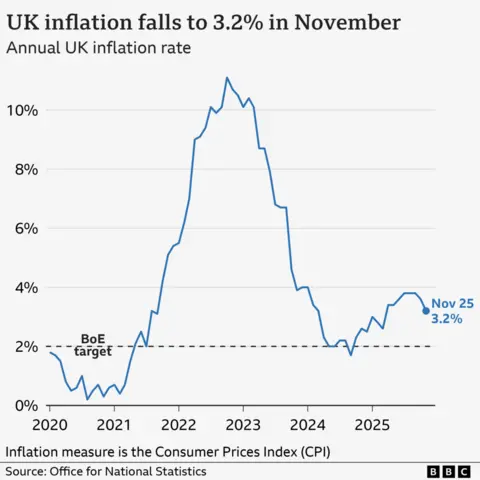
And it was the price of food - an essential for consumers - driving November's drop in inflation.
Food and non-alcoholic drinks rose by 4.2% in the year to November, compared to 4.9% in October. Alcohol and tobacco were up 4% compared to 5.9% in October.
Moving in the opposite direction to chocolate, and beef and veal (which rose by nearly 28% in a year), were olive oil (down 16%) as well as drops in price for flours, pasta and sugar.
Importantly, food is essential spending. When the price rises slow, this is much better news for those on lower incomes who see a bigger proportion of their income spent on things that it is impossible to do without.
Sarah Coles, head of personal finance at investment firm Hargreaves Lansdown, said this was also helpign the overall inflation rate drop faster than expected: "It has been following the path the Bank of England had forecast - peaking in September and gradually moving south."
The reasons for slowing price riese are often specific to individual items.
For example, the drop in the price of olive oil is primarily the result of a recovery in harvests after some particularly bad years of heatwaves and drought in Greece and Turkey.
Clothing and footwear prices fell by 0.6% in the year to November compared to a rise of 0.3% in October.
This has been linked to shops bringing forward Black Friday discounts due to weak sales as shoppers struggle with the cost of living pressures.


Consumers, too, have changed their habits owing to the financial climate of recent years.
Lucy Fairs, who helps run a cake-sharing social club, called Band of Bakers in Camberwell, London, said that, over the last five years, they had started using what they already had in their cupboards, rather than buying extra special ingredients.


"When I chose a recipe for today, I thought of the theme - but, more so, I thought of what I already had in my pantry," said club member Costa Christou.
The rising cost of goods and services has an impact on the money you save or earn. Inflation erodes the spending power of money you've got saved and - unless you get a pay rise - of your salary.
Analysts say the latest inflation data strengthens the likelihood of a cut in interest rates by the Bank of England's Monetary Policy Committee on Thursday.
That should make it cheaper for consumers to borrow money, but bring lower returns for savers.
"Lower inflation is good news for household budgets, but it is a different story for savers," said Sally Conway, savings commentator at Shawbrook Bank.
"Some savings will inevitably take a hit over Christmas. The key is what happens next. Once the dust settles, it's worth checking whether remaining cash is working hard enough."
Policymakers are trying to encourage more people to invest their money in stocks and shares - which they say is likely to bring higher returns over time than cash savings.
It is why the Financial Conduct Authority has given the go-ahead for targeted support - a scheme that, for the first time, allows banks and financial firms to give suggestions about where to invest your money.
Additional reporting by Josh McMinn

 BBC
BBCThe Metropolitan and Greater Manchester police forces have said they will arrest people holding placards and chanting the phrase 'globalise the intifada' - an Arabic word for uprising.
In a statement following Sunday's mass shooting at Bondi Beach in Sydney, they said: "Violent acts have taken place, the context has changed - words have meaning and consequence. We will act decisively and make arrests".
The two forces also referenced the Manchester synagogue attack in October.
The UK's chief rabbi told the BBC this week that chants of 'globalise the intifada' had helped lead to the two attacks.
The police forces said: "We know communities are concerned about placards and chants such as 'globalise the intifada' and those using it at future protests or in a targeted way should expect" the two forces "to take action".
"Frontline officers will be briefed on this enhanced approach. We will also use powers under the Public Order Act, including conditions around London synagogues during services," the statement said.
Visible patrols and protective security measures around synagogues, schools, and community venues have been stepped up in London and Greater Manchester.
Fifteen people were killed and dozens of others were injured in Sunday's Bondi attack, which targeted Australia's Jewish community at an event celebrating the first night of Hanukkah.
Two people died in the knife attack at the Heaton Park Hebrew Congregation Synagogue on 2 October.
The term intifada came into popular use during the Palestinian uprising against Israeli occupation of the West Bank and Gaza Strip in 1987.
It was a largely unarmed and popular uprising that continued until the early 1990s. The intifada also saw the development of groups outside the control of the Palestine Liberation Organisation (PLO) – notably Hamas.
This breaking news story is being updated and more details will be published shortly. Please refresh the page for the fullest version.
You can receive Breaking News on a smartphone or tablet via the BBC News App. You can also follow @BBCBreaking on X to get the latest alerts.

 Getty Images
Getty ImagesWarner Bros Discovery will urge its shareholders to reject Paramount Skydance's $108.4bn (£80.75bn) takeover bid as soon as Wednesday, according to reports.
Paramount has said its offer is "superior" to a $72bn deal that Warner Bros struck with Netflix for its film and streaming businesses.
At the same time, a key backer of Paramount's attempt to buy Warner Bros, Affinity Partners, has reportedly pulled out of the bid, citing the involvement of "two strong competitors". Affinity was founded by US businessman and President Donald Trump's son-in-law Jared Kushner.
Warner Bros declined to comment when contacted by the BBC. Paramount and Affinity have also been asked for a response to the reports.
Warner Bros will advise its shareholders to reject Paramount's offer for a number of reasons including concerns over how the deal would be financed, according to the Financial Times.
The media giant put itself up for sale in October after receiving "multiple" expressions of interest from potential buyers, including approaches from Paramount Skydance.
On 5 December, Warner Bros Discovery said it had agreed to sell its film and streaming businesses to Netflix.
The following week, Paramount Skydance launched a new offer for the whole company, including its television networks.
Paramount is backed by the billionaire Ellison family, which has close ties to the president.
A takeover of Warner Bros is expected to face scrutiny from competition regulators in the US and Europe.
A new owner of Warner Bros would gain a significant edge in the highly competitive streaming market. It would get a huge library of films and TV shows, including Harry Potter, Friends and the HBO Max streaming service.
Some in the film industry have criticised the deal. The Writers Guild of America's East and West branches called for the merger to be blocked, arguing that it would result in lower wages and job cuts.
The volume of content for viewers would also be reduced, it said.

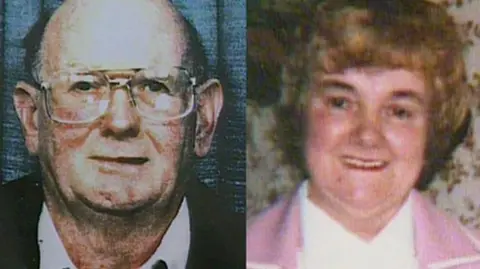 South Wales Police
South Wales PoliceAn 86-year-old man has been arrested in connection with the murders of a couple at their farmhouse more than 30 years ago.
Harry and Megan Tooze were both found dead with gunshot wounds at their Ty Ar y Waun rural home in Llanharry, Rhondda Cynon Taf, on 26 July 1993.
South Wales Police undertook a forensic review of the case in 2023 and detectives have now made an arrest for the unsolved murders of 64-year-old Harry and 67-year-old Megan.
The man was arrested earlier and is currently in police custody.
Senior investigating officer Det Supt Mark Lewis said: "While this arrest is clearly a significant development in the investigation, our enquiries are very much ongoing.
"This case has affected many people over the years and our aim is to find the answers to the unanswered questions which remain about their deaths over 30 years on.
"Even with this passage of time I appeal to anyone who has any information about the murders to come forward and speak to police."

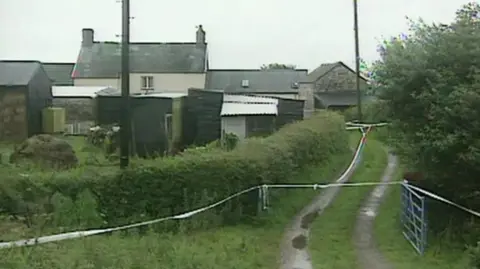
Harry and Megan Tooze had left their farm on the morning of Monday 26 July 1993 to collect their pensions in Llanharry and were seen arriving back at 11:00 GMT.
At around 13:30, two gun shots were heard by neighbours, but this was not considered unusual on a farm.
The couple's daughter Cheryl raised the alarm when her phone calls went unanswered. Officers went to the farm and found the couple's bodies in the cow shed.
They had both been shot in the head with a shotgun and covered in carpet.


Their daughter's boyfriend Jonathan Jones was found guilty of their murders and sentenced to life in prison in 1995, but was later freed on appeal.
Mr Jones, who was a self-employed recruitment consultant, had told police he had taken the day off work on the day the Toozes were killed.
He said he had gone to Orpington, Greater London, to look for office space to rent, but police could not find anybody who had seen him that day.
His partial thumbprint was also on a cup and saucer that had been found in the couple's living room.
He was arrested that December, five months after the murders.
Cheryl Tooze stood by him, moving in with his family in Caerphilly after his arrest.
A year after his conviction he was released on appeal. Three appeal court judges took five minutes to reach their decision.
The original trial judge was criticised and it emerged police had failed to seal the crime scene properly.

Jannik Sinner won the Australian Open and Wimbledon in 2025, while Carlos Alcaraz claimed the French Open and US Open
Dominance at the top of the men's game is nothing new.
As age caught up with Roger Federer, Rafael Nadal and Novak Djokovic, thoughts turned to the void left by the 'Big Three', who won 66 of the 78 Grand Slams held between 2004 and 2023.
Carlos Alcaraz and Jannik Sinner have shattered any expectation of the men's majors being blown wide open.
The pair have swept the past eight Grand Slams and dominated the ATP Tour, leading to one question: can anybody stop them in 2026?
"I see a lot of guys who can start to become a threat if they progress, but to say this person will be a threat next season is difficult," Patrick Mouratoglou, who coached 23-time major singles champion Serena Williams between 2012 and 2022, told BBC Sport.
"If you look at the margin those two guys have above the other players, it's difficult to imagine."
BBC Sport picks out five players who could potentially end the 'Sincaraz' duopoly next season.
At the bottom of the page, you can have your say and predict the next men's Grand Slam champion outside of the pair - plus when and where it will be.
Alcaraz announces shock split with coach Ferrero

Ben Shelton won the biggest title of his career at the Canadian Open in July
Age: 23
World ranking: 9
Career Slam highlights: 2023 US Open semi-finalist, 2025 Australian Open semi-finalist
With serves touching 150mph and plenty of on-court sass, Shelton announced himself with his run to the New York semi-finals in 2023.
The left-handed American reached another Grand Slam semi-final in Melbourne this year, but came unstuck against Sinner.
His progress at the next two majors was blocked by Alcaraz at Roland Garros and Sinner again at Wimbledon.
"I think the next guy will have to have a huge ego if he wants to be in the mix - so it can be someone like Shelton, maybe," said Mouratoglou.
"He will have to make progress but I think his confidence in himself and in his game is big enough."
Former British number one Greg Rusedski agrees Shelton has the "firepower" to win a major.
"But only if he makes the improvements on his backhand, his court positioning and plays the big points better," Rusedski added.

Taylor Fritz's two titles in 2025 - Stuttgart and Eastbourne - both came on grass courts
Age: 28
World ranking: 6
Career Slam highlights: 2024 US Open finalist
Fritz has been a staple in the top 20 for the past four seasons, with a game built around a serve that was ranked second on the ATP Tour in 2025.
An aggressive approach from the baseline supports the American's opening shot, with a steely drive and work ethic underpinning his consistency.
Fritz's problem so far has been simple: his level is not as high as Alcaraz or Sinner's.
He has won just two of his 11 matches against the pair - one victory over each but none at a major - but is seen as the "likeliest to close the gap" by former world number four Tim Henman.
"He's so efficient on serve and at the back of the court, both forehand and backhand, but [he needs to] try to finish a few points at the net when he's so aggressive from those groundstrokes," Henman said on Netflix's coverage of the Six Kings Slam exhibition event.
"He's brought in the drop shot a little bit, which is good to get the opponents moving forward to backwards, not just side to side."

Jack Draper won his first Masters title - the tier of tournaments below the Grand Slams - at Indian Wells in March
Age: 23
World ranking: 10
Career highlights: 2024 US Open semi-finalist
Draper's promise is illustrated by him finishing 2025 as the world number 10, despite playing only 11 tournaments.
With his left-handed serve and forehand able to puncture the defence of most opponents, the British number one has beaten both Sinner and Alcaraz over three sets - including the latter on his way to Indian Wells glory in March.
"Someone like - and I've got my biased hat on here - a fully fit Jack has weapons," Britain's Davis Cup captain Leon Smith told BBC Sport.
"I think it helps the fact he's a leftie. There's big serving, big cuts of the ball.
"He can beat them - we've seen it before in one-off matches.
"But to win the Slams you are probably going to have to beat one of Sinner or Alcaraz in the semi-finals and then beat the other one in the final - that's the biggest challenge."

Felix Auger-Aliassime has reached a career-high ranking after a stunning finish to 2025
Age: 25
World ranking: 5
Career Slam highlights: 2021 & 2025 US Open semi-finals
When Auger-Aliassime reached his first Grand Slam semi-final in 2021, it felt like he was primed for the very top.
However, his progress was derailed by a string of injuries and a lack of belief at the biggest events.
The Canadian started 2025 outside of the world's top 20, but his game - booming serve, vicious groundstrokes and supreme athleticism - came together late in the season.
He surged into the top five after reaching the US Open semis, claiming the Brussels title and losing to Sinner in the Paris Masters final.
"I like the way he has matured in the past three to four months and how he played at the US Open," said Tennis Channel analyst Mark Petchey.
"He has got big weapons. I look at Jannik and Carlos and if you don't come with firepower, they are going to get you every single time."

Novak Djokovic won his 101st career singles title at the Hellenic Championships, but has not won a major since the 2023 US Open
Age: 38
World ranking: 4
Career Slam highlights: 24-time major singles titles
That Djokovic consistently looks the most likely to disrupt the 'New Two' is testament to his enduring brilliance.
It is also damning about the rest of the pack.
"Despite barely playing, he was still the third-best player on the planet this year, and he still wants to keep going," Rusedski said.
By his own admission, Djokovic's problem going into 2026 is beating Sinner and Alcaraz over five sets.
Somehow, the Serb managed to oust Alcaraz at this year's Australian Open and Melbourne - where Djokovic is a 10-time champion - perhaps represents his best chance to win a standalone record 25th major title.
Germany's Alexander Zverev is the nearest challenger in terms of ranking and has long been predicted to win a Grand Slam.
However, the 28-year-old has regularly shown he lacks the belief to get over the line - including three defeats in major finals.
And what about the precocious talents emerging?
Brazil's Joao Fonseca, 19, is tipped for big things but is far from the finished product, while 20-year-old Czech Jakub Mensik - who beat Djokovic in the Miami final - is the youngest player in the world's top 20.
"They're not ready at the moment to win a Slam, they are still so far away from the top two," Rusedski added.


 Getty Images
Getty ImagesThe Prime Minister has said Russian oligarch Roman Abramovich must "pay up now" to victims of the war in Ukraine or face court action.
Mr Abramovich, the former owner of Chelsea Football Club, pledged in 2022 that money from the sale of the club would go to benefit victims of the Russian invasion of Ukraine.
The money has been frozen in a British bank account since the sale after he was sanctioned following Russia's invasion of Ukraine.
Speaking in the Commons, Sir Keir Starmer said the UK had issued a licence "to transfer £2.5bn from the sale of Chelsea Football Club that's been frozen since 2022."
Sir Keir said: "My message of Abramovich is clear: the clock is ticking.
"Honour the commitment that you made and pay up now, and if you don't we're prepared to go to court and ensure that every penny reaches those whose lives have been torn apart by Putin's illegal war."
The Treasury said that under the terms of the licence, the money must go to "humanitarian causes" in Ukraine and cannot benefit Mr Abramovich or any other sanctioned individual.

© Nati Harnik/Associated Press

© Matthew Abbott for The New York Times

© Mario Anzuoni/Reuters

中国外长王毅认为,中东长期陷于动荡,既有错综复杂的历史背景,也有外部势力大搞地缘争夺的因素。解决问题的钥匙就在于充分尊重中东历史经纬,契合中东地缘现实,顺应中东发展方向,呼应中东人民意愿。
应中东三国外长邀请,王毅12月12日至16日先后访问阿联酋、沙特、约旦,结束六天访问行程后接受中国媒体采访。采访问答于星期四(17日)在中国外交部官网上发布。
对于今年中东战乱频发、动荡不定,王毅指出,中东饱受战乱之祸、流离之苦,始终是全球热点问题最集中的地区。该地区今年连续经历巴以、伊以两场大规模冲突,安全形势更加脆弱敏感,各种矛盾相互叠加作用。
王毅表示,当前中东国家团结自主势头在上升,积极要素在积累,但仍面临严峻挑战。中国将继续支持中东国家探索维护自身和平、实现共同安全的有效路径。
他指出,北京也将推动国际社会尊重中东人民的自主选择,重视地区国家的合理关切,坚持通过对话协商以和平方式解决分歧争端,不断增强自主发展的能力和韧性,以发展促稳定,以稳定保安全。
中国国家主席习近平12月4日在北京宣布,将向巴勒斯坦提供1亿美元(1.3亿新元)援助。王毅说,这新一笔援助,重在缓解加沙人道主义危机,支持加沙恢复与重建。
王毅指出,巴勒斯坦人民已经承受太多苦难,巴勒斯坦问题也已积聚太多不公。本轮巴以冲突正是巴勒斯坦问题长期被边缘化、工具化的恶果。
他重申,在解决巴勒斯坦问题上,“两国方案”是唯一路径,“巴人治巴”是重要基础。任何关于加沙未来的安排,都应尊重巴勒斯坦人民的意愿,照顾中东国家的合理关切。
王毅表示,将继续支持巴勒斯坦在加沙战后治理中的主体地位,敦促国际社会切实承担责任,避免战火重燃,缓和人道困局,共同推动巴勒斯坦问题重回正确轨道。

 BBC
BBCA 15-year-old boy has been charged with the murder of nine-year-old Aria Thorpe.
Aria was found dead at a house in Lime Close, Weston-super-Mare, shortly after 18:00 GMT on Monday.
A post-mortem examination found the preliminary cause of her death was a single stab wound, Avon and Somerset Police said.
The teenage suspect, who cannot be named due to his age, remains in custody and is due to appear at Bristol Magistrates' Court later.
This breaking news story is being updated and more details will be published shortly. Please refresh the page for the fullest version.
You can receive Breaking News on a smartphone or tablet via the BBC News App. You can also follow @BBCBreaking on X to get the latest alerts.

 PA Media
PA MediaThe Duke of Marlborough has been charged with intentional strangulation.
The 70-year-old is accused of attacking the same person in Woodstock, Oxfordshire, three times over an 18-month period.
Charles James Spencer-Churchill, formerly known as Jamie Blandford, is a relative of Sir Winston Churchill and Diana, Princess of Wales.
He is due to appear before Oxford magistrates on Thursday.
The offences are alleged to have taken place between November 2022 and May 2024, Thames Valley Police said.
Spencer-Churchill, the former Marquess of Blandford, was arrested on 13 May 2024.
The twice-married aristocrat inherited his dukedom in 2014, following the death of his father, the 11th Duke of Marlborough.
You can follow BBC Oxfordshire on Facebook, X, or Instagram.

 PA Media
PA MediaPatients are being told to expect disruption as doctors start their five-day strike in England, with NHS bosses saying they are struggling to keep as many services going as they have done in recent walkouts.
NHS England said with a wave of flu placing pressure on hospitals, non-urgent services would be affected by the strike which begins at 07:00 Wednesday.
This is the 14th walkout by resident doctors, the new name for junior doctors, in the long-running pay dispute.
Health Secretary Wes Streeting said the strike had been timed to inflict most damage on the NHS and put patients at risk, but the British Medical Association said it would work with NHS bosses to ensure patient safety.
The strike is being held after the two sides held last-minute talks on Tuesday afternoon.
The talks were described as "constructive" by the government, but not enough progress had been made to call off the strike.
Resident doctors represent nearly half of the doctors working in the NHS. They will walk out of both emergency and non-urgent care with senior doctors drafted in to provide cover.
In the two most recent strikes – in July and November – NHS England said it was able to keep the majority of non-urgent operations and treatments, such as hip and knee replacements, going.
But NHS England said it expected more disruption this time. Concern has also been expressed that hospitals may struggle to discharge patients in time for Christmas as the doctors who are working concentrate on providing strike cover.
Medical director Prof Meghana Pandit said: "These strikes come at an immensely challenging time for the NHS, with record numbers of patients in hospital with flu for this time of year.
"Staff will come together as they always do, going above and beyond to provide safe care for patients and limit disruption.
"But sadly more patients are likely to feel the impact of this round of strikes than in the previous two – and staff who are covering will not get the Christmas break they deserve with their families."
Streeting added: "We have been working right up to today to try and avert these strike actions.
"Everyone knows the period leading up to Christmas and into the New Year are always the busiest for the NHS. With super flu, this year is harder.
"And that double whammy of flu plus strikes means that there is an additional burden now on other NHS staff."
NHS England said GP practices will continue to be open and urgent and emergency care services will be available for those who need them.
But even then there is likely to be some disruption. Cheltenham General Hospital's emergency department is closing for emergencies during the strike - it will remain open for minor injuries - with patients advised to use nearby Gloucestershire Royal Hospital.
NHS England said the public should use 111 online as the first port of call for urgent, but not life-threatening issues during the strike.
Patients who need emergency medical care should continue to use 999 or come forward to A&E as normal, it added.
The strike is going ahead despite a new offer from the government being made last week, which included increasing the number of speciality training posts and covering out-of-pocket expenses like exam fees.
The speciality training jobs, which resident doctors start in year three of their training after completing medical school, have become highly competitive.
This year 30,000 applicants went for 10,000 jobs – although some of the applicants were doctors from abroad.
Dr Tom Twentyman is one of those who lost out after trying to secure an emergency medicine post. He says finding a job is an "absolute nightmare".
Since then he has been struggling to find work, juggling a handful of locum shifts each month at the same time as applying for more than 40 short-term contracts at hospitals across the country – one of which he now secured.
But this will not count towards his training, so he will now look to reapply next year.
"Some of the job adverts were coming down within two hours of going up after they received 650 applications, which is clearly an enormous number to shortlist," he says.


On Monday the BMA announced its members had voted to continue with the strike – effectively rejecting the offer in the process – after the union agreed to hold an online poll of members.
BMA resident doctor leader Dr Jack Fletcher described it as a "resounding response" and said the government needed to go further on jobs as well as pay.
Streeting has maintained he will not discuss pay as doctors have received pay rises totalling nearly 30% over the past three years.
The BMA argues that, despite the pay rises, resident doctors' pay is still a fifth lower than it was in 2008, once inflation is taken into account.
Dr Fletcher added: "It is well past the time for ministers to come up with a genuinely long-term plan.
"If they can simply provide a clear route to responsibly raise pay over a number of years and enough genuinely new jobs instead of recycled ones, then there need not be any more strikes for the remainder of this government."
But the BMA said it was committed to ensuring patient safety.
"We will be in close contact with NHS England throughout the strikes to address safety concerns if they arise," the union added.

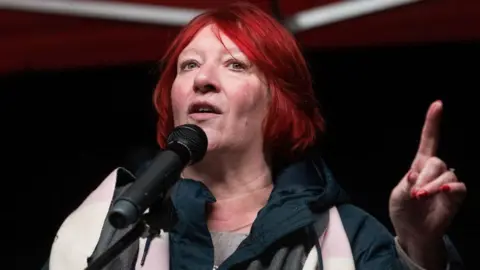 Getty Images
Getty ImagesLeft-wing candidate Andrea Egan has been elected as the new leader of Unison, the UK's biggest trade union, in a blow to Sir Keir Starmer.
Ms Egan, who was expelled from the Labour Party three years ago, beat the union's current general secretary Christina McAnea, an ally of the prime minister.
Following her election, Ms Egan promised to "stand up to any employer, politician or cabinet minister who acts against our interests".
During her campaign, she had pledged to hold Labour's "feet to the fire" and refuse to write the party "blank cheques".
Congratulating Ms Egan on her victory, Sir Keir said he looked forward to working with her.
The PM also praised Ms McAnea's "outstanding contribution to the Labour and trade union movement".
"She played an important role in securing the landmark Employment Rights Bill and her work has ensured this Labour government will bring in a fair pay agreement to boost the wages of social care workers," he added.
With more than 1.3 million members working in sectors providing public services, including education, local government, the NHS and the police, Unison is the UK's biggest trade union.
Ms Egan won just under 60% of the vote, although turnout was low, with fewer than 100,000 of the union's members taking part.
She will begin her five-year term in January.
In a statement following her victory, Ms Egan said: "This result means ordinary Unison members are at long last taking charge of our union.
"We will put faith in members' decisions and stand up to any employer, politician or cabinet minister who acts against our interests."
Ms Egan's election was welcomed by former Labour leader Jeremy Corbyn and his new left-wing group, Your Party.
A Your Party spokesperson said: "Andrea's victory on an anti-austerity ticket shows that working-class people won't take more cuts and more decline.
"Unison members have said no to Starmer's crumbs off the table, no to chronic low pay, no to underfunding and no to privatisation."


Sign up for our Politics Essential newsletter to keep up with the inner workings of Westminster and beyond.

 Reuters
ReutersHollywood star Timothée Chalamet is compiling his list of five Brits who he considers to be all-time greats.
"Lewis Hamilton, David and Victoria," he begins, referring to the seven-time Formula One champion and the Beckhams.
"Fakemink," he continues, naming the underground London rapper who recently teamed up with EsDeeKid, the anonymous Liverpool drill artist who many have linked to Chalamet.
("No comment," is his reply when pressed on this. "All will be revealed.")
But Chalamet's final pick of someone who demonstrated British greatness comes totally out of left field.
After a long pause and some deep thought, he reveals his answer: "Susan Boyle."
Yes, it turns out that one of the biggest movie stars on the planet is an admirer of the 64-year-old former Britain's Got Talent star, who went on to have two US number one albums.
"She dreamt bigger than all of us," he explains, without any hint of irony.
"Who wasn't moved by that?" he says about the 2009 viral clip of the Scottish singer performing I Dreamed A Dream from Les Misérables on the talent show.
"I remember that like it was yesterday," the actor says. "That was like the advent of YouTube, you know."

 Getty Images
Getty ImagesChalamet, 29, knows a lot about using social media to advance a career.
The reason he is selecting great Britons, is due to one of the many ways he has found to promote his new 1950s table tennis film, Marty Supreme.
For the last month, he has been presenting jackets bearing the film's title to people he deems as being a great.
Honourees so far include swimmer Michael Phelps, NFL legend Tom Brady and Barcelona's Spanish wonder kid Lamine Yamal.
Now his promotional tour has taken him to London, where he opened a pop-up store and is now sitting in a hotel bar looking out over Hyde Park.
I had asked him which Brits would be worth of receiving a jacket, resulting in the SuBo surprise.

 Andrew Yates/AFP via Getty Images
Andrew Yates/AFP via Getty ImagesChalamet's frenetically entertaining performance in Marty Supreme has already landed him best actor nominations at both the Golden Globes and the Critics Choice Awards, and the Oscar race is currently seen as a head-to-head between him and Leonardo DiCaprio.
The film is based on real life post-war table tennis star, Marty Reisman. The semi-fictionalised film version Marty Mauser, however, has some dubious morals, getting involved in a heist and trying to destroy the marriage of his biggest sponsor, who he resents.
Despite his questionable on-screen actions, Chalamet is a big fan of his character.
"You know, when you're in your early twenties, you're an idiot," he laughs. "And this movie, in large part, is about being an idiot in your early twenties.
"And if on top of that, you have a passion that you're singular about, you risk looking foolish in addition to being an idiot."

 A24
A24Marty Mauser exudes the same confidence that Chalamet demonstrated while collecting his best actor SAG Award this year for playing Bob Dylan in A Complete Unknown.
During his acceptance speech he pontificated: "I'm really in pursuit of greatness. I know people don't usually talk like that, but I want to be one of the greats," before listing Daniel Day Lewis, Marlon Brando, Viola Davis and Michael Jordan, as actors who inspired him.
I ask where his confidence comes from.
"You know, it ebbs and flows. And I feel like that's kind of what keeps me on my toes," he says, in a far more humble way that he demonstrated on stage at the SAGs, wearing a bright green suit.
"It's my New York mentality insofar as if I'm on a movie or in a social situation, if things are going well, you feel great. And if not, the world's falling apart," he says, becoming far more introspective than I had expected.
"And I think increasingly in my life, like as I approach 30 here in a couple weeks, you want to be more on your feet. You want to grow into yourself. But that is a constant learning process. And it's a huge learning curve. And I try not to be too hard on myself or those around me who are also growing."

 Getty Images
Getty ImagesThe actor's landmark birthday presents the perfect chance to ask him how he looks back at his twenties, a decade in which he has twice been nominated for best actor at the Oscars, and starred in huge box office hits including Dune and Wonka.
A huge smile comes over his face as he says: "It's been great. You know, it's been awesome.
"I feel like I'm living in a dream. I'm on top of a fancy hotel in London and talking about a film I'm deeply passionate about.
"And, you know, I got to offend somebody from Scotland the second they walked in with my English shirt," he jokes, referencing my barely disguised displeasure at his choice of interview garb.
Chalamet's dedication to roles is part of his success. He spent five years learning to play the guitar to play Bob Dylan; for Marty Supreme he embarked on seven years of table tennis lessons.
"I got approached with this project in 2018. So that basically gave me six, seven years to prepare on and off. In all my downtime, I would train as much as possible," he enthuses.
"I think the responsibility in this movie, like in the Bob Dylan movie, if you were a Dylan fan or a guitar player, that that looks real to you on screen. Similarly here, if you're a ping-pong aficionado, that that looks believable to you."
His dedication included taking his table tennis table into the desert during Dune and it was oompah-loompah ping-pong between takes on Wonka.
And he's already learning skills for film roles way in the future.
"I can't give anything away, but I do have a couple of white rabbits up my sleeve."

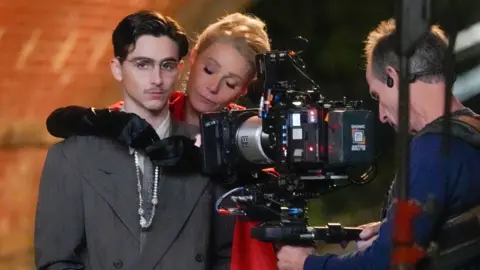 Getty Images
Getty ImagesOne thing that is totally clear, is his love of the big screen.
In the same month that Netflix has announced its intention to buy one of the major film studios, Warner Bros, Marty Supreme is a film which will have a wide cinema release and has not been made for any streaming service.
It has been produced by A24, the independent film company behind recent Oscar favourites Moonlight, Past Lives and The Brutalist.
"That is an intense question," Chalamet muses after I ask him if he thinks cinemas will actually survive the length of his career.
"I do think with streaming stuff, there's less incentive for these streaming companies to try to put things in theatres, which is dangerous.
"But equally, I do think cinemas will survive and thrive. And that's not to be a false optimist."
And he wants to play his part.
"I feel like my responsibility as a young actor especially, is less to go, 'Hey, how do we get people to revisit this traditional form?' And rather to go, "Hey, how do we take this traditional form and bring it to people?"
Chalamet sincerely believes that Marty Supreme will, in its own way, help cinemas be saved.
"This is an original film at a time where a lot of original films aren't made.
"And there's no part of me that's a salesman that's saying this, but I've never been more confident in saying, "Hey, if you bring yourself to see this movie, you won't be let down. It's really like a slingshot."
Timothée Chalamet – about to turn 30 and more than ready to channel his inner Susan Boyle and dream his dream.
Marty Supreme is released on Boxing Day.

 EPA
EPAFinland's delegate to last month's Miss Universe pageant held in Thailand has sparked a racism firestorm over a viral photo that showed her pulling the corners of her eyes.
Sarah Dzafce, who has been dethroned, uploaded the photo with the caption "eating with a Chinese". The slanted-eyes pose is often seen as disrespectful to East Asians.
The post drew backlash in Japan, South Korea and China against the 22-year-old and even against her country's flag carrier, Finnair.
Back home in Finland, the prime minister said on Monday making such gestures was "thoughtless and stupid" and that the controversy that ensued was "damaging" to the country.
Ms Dzafce claimed the gesture was her reaction to a headache during dinner. She said a friend added the offensive caption to the 11 December post without her consent, according to local tabloid Ilta-Sanomat.
Ms Dzafce has apologised for the photo, noting it has "caused ill will in many people".
"That was not my intention in any way... One of the most important things for me is respect for people, their backgrounds and differences," she wrote on an Instagram post.
The apology still drew criticism, with some calling it "insincere" given it was written in Finnish.
"Not sure Chinese outside of Finland would understand it. Such considerate and sincere apology," one wrote in a comment on her post.
Another wrote: "That was uncalled for, Asian people didn't do anything to you... We [are] still disappointed in you."
Two right-wing MPs in Finland, Juho Eerola and Kaisa Garedew, posted photos of themselves mimicking Ms Dzafce's gesture to show their support for the beauty queen.
The posts were taken down after backlash. Eerola apologised adding he felt Ms Dzafce was given "disproportionately harsh punishment".
Finnish Prime Minister Petteri Orpo condemned the MPs' actions as "childish", adding that lawmakers should set an example of proper conduct.
The Finns Party is deliberating whether the MPs should face any sanctions for their actions, local media reported.
Finland's flag carrier Finnair told public broadcaster Yle that the controversy had affected the company, and that there had been calls for tourists to boycott Finland.
"The statements or posts mentioned by some Finnish members of parliament do not represent the values of Finnair," the airline wrote on its Japanese X account on Tuesday.
"As an airline supported by employees from diverse backgrounds and customers around the world, we promise to welcome everyone with respect," it wrote.
The debacle has also drawn attention in Japan, South Korea and China, among other East Asian countries.
A Japanese man living in Finland launched an petition calling for an investigation into anti-Asian discrimination, which had gathered more than 7,000 signatures as of Sunday evening, the Asahi Shimbun reported.
The Finnish embassy in Japan said it had received "numerous opinions and questions" on Finland's efforts to address racism.
"Racism remains a challenge in Finnish society, and its resolution requires continuous and resolute efforts," it acknowledged in an X post early this week.
The controversy around Ms Dzafce is a postscript to a chaotic Miss Universe audition hosted in Thailand that had been hounded by walkouts and allegations of rigging.
The Miss Finland Organisation said dethroning Ms Dzafce was a "difficult but necessary" move.
"Miss Finland holds a position of role-model status, which requires respecting all people regardless of their origin, background, or appearance," the organisation said in a statement.
"We are deeply sorry for the harm these events have caused. Especially to the Asian community, but also to everyone affected. Racism is never acceptable in any form," it wrote.
This video can not be played
England take wickets but Carey century highlights first day of third Test
Third Ashes Test, Adelaide Oval (day one of five)
Australia 326-8: Carey 106, Khawaja 82; Archer 3-29
England: yet to bat
Australia won the toss
England battled hard to stay in the Ashes as Alex Carey's century led Australia to 326-8 on the first day of the third Test.
On a dramatic, poignant and emotional day in Adelaide, Carey's composed 106 ensured Australia did not waste the opportunity to bat first on a slow pitch in baking temperatures.
Carey's knock was not without controversy. On 72 England failed with a review for caught behind off Josh Tongue, which Carey later admitted to edging.
Australia's effort means England, who must win to keep their hopes of regaining the Ashes alive, will be batting under pressure on the second day.
Even before the Adelaide Oval paid tribute to the victims of the shooting at Bondi Beach, Steve Smith was ruled out of the Test with symptoms of dizziness and nausea.
Smith's replacement Usman Khawaja took his unexpected opportunity with 82 after being dropped by Harry Brook on five. Khawaja steadied the home side amid some loose Australian shots against some mixed England bowling.
Jofra Archer was outstanding for his 3-29 from 16 overs, including taking two wickets in the first over after lunch.
Khawaja and Carey added 91 for the fifth wicket, yet when Australia were reduced to 271-7 England had a real opportunity.
Once again, Mitchell Starc found a way to contribute, adding 50 for the eighth wicket with Carey.
England will return on Thursday with a second new ball only three overs old. They have the chance to dismiss Australia for a par total, then could potentially bat themselves back into the series.
This video can not be played
'Terrific' Carey brings up first Test century against England
This video can not be played
Australia and England players unite in minute's silence for Bondi shooting victims
For all the talk of England errors in the first two Tests, the wisdom of their holiday in Noosa and a change of approach in this match, the tourists cannot be faulted for their effort or attitude in the 34-degree heat.
There were times when the bowling was ragged and part-time off-spinner Will Jacks struggled to contain.
But Archer stepped up as the attack leader and, bar the Brook drop, England's fielding was largely blemish-free.
They were helped by the wastefulness of the Australians, who had to deal with the loss of Smith. The hosts' premier batter is expected to be fit for the fourth Test on Boxing Day.
The mood at the Adelaide Oval - one of the most beautiful grounds in world cricket – was initially sombre as the victims of Bondi were mourned. A moment's silence was observed and Australian singer John Williamson performed 'True Blue'.
From then on the cricket was nip-and-tuck, an arm-wrestle for supremacy. Both sides mixed moments of quality with self-inflicted errors.
Even in such good conditions for batting, there was a suspicion this was a good toss for England to lose. They are a good chasing team and Thursday is forecast to be even hotter. Still, there is the extra heat of batting to stay in the Ashes.
This video can not be played
Khawaja reaches half-century on return to Australia side
Their respective innings would have carried plenty of meaning for both Khawaja and Carey.
A day short of his 39th birthday, Khawaja may have thought his Test career was over until Smith's illness. For Carey, a South Australian, this was a first Test on his home ground since the passing of his father in September.
Both men arrived after two wickets fell in quick succession. Khawaja looked nervous at first and a flashing drive at Tongue should have been held by Brook diving to his left at second slip.
From there, left-hander Khawaja waited for England to drift straight and tucked off his pads – barely a run came in front of square on the off side. He eventually fell sweeping Jacks into the hands of deep square leg.
Carey is proving a thorn in England's side and a third Test century came with crisp drives and aggression against Jacks.
He was almost caught on 52, only for Carse to put down an extremely difficult chance, then came the huge moment of the review.
With Australia 245-6, Carey aimed a cut at Tongue that ended in the gloves of Jamie Smith. Denied the decision on field, the tourists called for a review.
Carey even appeared to nod towards the England players, suggesting he hit the ball. Despite evidence of sound on the technology, TV umpire Chris Gaffaney did not overturn the decision of Ahsan Raza.
Carey drove Ben Stokes through the covers to reach three figures, celebrating with a look to the sky. His crucial knock was ended when he miscued Jacks into the hands of wicketkeeper Smith.
This video can not be played
'What a stunner' - Crawley takes brilliant one-handed catch to dismiss Head for 10
Stokes has said his dressing room is "no place for weak men" and called this the most important Test of his captaincy. His words certainly drew a show of character from his team.
Archer was a constant threat, bowling with high pace and miserly economy. He bounced out Jake Weatherald in the first hour, then produced leg-side pokes from both Marnus Labuschagne and Cameron Green in the over after lunch.
Carse typified England's ups and downs. He was far too short with the new ball, yet still took the wicket of Travis Head thanks to Zak Crawley's stunning one-handed catch at short cover.
The Durham paceman leaked runs at more than five an over and bowled six no-balls, though still took two catches, almost held Carey and had returning Australia captain Pat Cummins caught at short leg.
Tongue deserved more on his recall to the England side, especially as the victim of Brook's drop. The most obvious issue for the tourists was part-time spinner Jacks' inability to hold an end – he returned 2-105 from his 20 overs.
But even when the day looked like it could get away from England when Carey and Starc were together, Stokes' men stuck at it. They are in this Test and now face a day of reckoning with the bat.


 Prime Video
Prime VideoThe second season of Fallout - Prime Video's mega-hit based on the popular video game series - has landed.
Set in a post-apocalyptic future where Earth has been ravaged by nuclear war, the first series was a commercial and critical hit, impressing long-time fans and viewers who'd never played before.
Its surprising success had a huge impact on Bethesda Softworks, the developer of its source material, bringing back lapsed players and creating new ones along the way.
Key creatives from the company have told BBC Newsbeat about working with the show's producers, and what the success of the programme means for the future of the games.
The first season of Fallout arrived at a turning point for Hollywood video game adaptations.
Often far-removed from their source material, and often just a bit rubbish, they'd gained a reputation as low-quality cash grabs.
Then The Last of Us came along.
The 2023 adaptation of the PlayStation blockbuster, released ten years earlier, was a smash hit.
It impressed fans of the games, as well as winning over critics and viewers who'd never picked up a controller.
But there were those who argued the show's creators were running on easy mode.
Because the post-apocalyptic story of bounty hunter Joel and his adoptive daughter Ellie drew heavy influences from prestige TV shows, there was an obvious road map for bringing it to the screen.
The drama's story closely followed the game's, with a few deviations, and fans pointed out shot-for-shot comparisons where sequences were almost identical to their pixelated inspiration.
While The Last of Us was wowing audiences, the producers of Fallout were putting the finishing touches to the first season of their adaptation, one which took a different approach to its source material.

 Bethesda
BethesdaUnlike The Last of Us, which guides the player through a linear story experience, the Fallout games drop them into a more freeform world.
The branching narratives, full of side quests and incidental characters, offer plenty of material to draw from, but deciding what to bring to the screen is a mammoth task.
Todd Howard, director of developer Bethesda Game Studios, tells Newsbeat he was first approached about a filmed version of the game in 2009.
He was agreeable to the idea, he says, but didn't push ahead until meeting executive producer Jonathan Nolan.
Todd says he was a fan of the Briton's work on HBO's Westworld, and impressed by his co-writer credits on films such as The Dark Knight and Interstellar directed by his brother, Christopher Nolan.
The feeling was mutual.
"It turned out he was a huge fan of Fallout," says Todd.
He says the two have become "very close friends" while working on the show together, and he believes it's helped to create trust between the TV and gaming side.
"Everyone involved is on the same page with how they want to treat it with authenticity," he says.
One of the people in charge of keeping the TV show authentic was studio design director Emil Pagliarulo, a Bethesda veteran who's been closely involved with the Fallout series since its breakout third instalment, released in 2008.
He tells Newsbeat there was an early decision to keep the TV show "canon" - that would become a guiding principle.
That meant "everything that happens in the show happened in the games, or will happen in the games," says Emil.
Fallout, first launched in 1997, has a deep well of established lore the series' biggest fans know well and feel protective of.
Emil admits there was some "back-and-forth" between the TV and gaming sides, especially earlier on.
"It's difficult because TV's an entirely different medium," he says.
"It's really about getting the tone right, but they were very respectful of where we wanted to take it."
He says the strict adherence to the video games' timeline did result in the "occasional late-night text" from the TV show's set.
"Hey, we're filming tomorrow, we had this question," recalls Emil.
"Is this… canonically right?"
"It was always a back-and-forth. It's really fun."

 Bethesda
BethesdaFor all the thrill of seeing world you dreamed up realised in another medium, there's a less romantic reason for TV and game studios to get behind adaptations.
As the first season of Fallout was released, prices on most of the games in the series were slashed, appealing to curious new players, and content updates and upgrades aimed at enticing lapsed players were also launched.
It had the desired effect - Fallout 4, the most recent big title, topped sales charts nine years after its original release.
But one of the most significant bumps came to Fallout 76, an online multiplayer spin-off launched in 2018.
The game was poorly received when it first came out, with players complaining of technical issues and a lack of activities in the world.
Bethesda's spent time since addressing those complaints, and managed to attract a healthy number of regular players.
When the first season of Fallout dropped, those numbers skyrocketed to an all-time high.
"We always knew that players would come in after seeing the show," production director Bill Lacoste tells Newsbeat.
But, creative director Jon Rush says "it's safe to say the amount of players that we saw come in, that was… a fun surprise."

 Prime Video
Prime VideoWith game-makers becoming more directly involved in adaptation work, fans often wonder what impact it has on future game instalments.
Jon says some new Fallout 76 players have stuck around, and it would be "impossible" for them to not have influenced the decisions developers make about regular updates and tweaks.
"Exactly which ways that is, I can't really say. It's kind of an organic process," says Jon.
"We don't make the game in a vacuum. We make it hand-in-hand with the folks that are playing it."
The big question for fans awaiting Fallout 5 - which is likely to still be years away from release - is whether the TV show will have an impact on the game.
"In short, yes," says Todd.
"Fallout 5 will be existing in a world where the stories and events of the show happened or are happening.
"We are taking that into account."
As for whether he's expecting a similar surge in new players in the wake of season two, Todd's not so sure.
"There's still so many people that won't play a game - I think that's getting better but there's still people who are intimidated," he says.
"They still get to experience Fallout and I think that's really important because they're now equal fans of the world."



 Reuters
ReutersIn a further escalation of tension between the United States and Venezuela, President Donald Trump has ordered a naval blockade to stop sanctioned oil tankers from entering and leaving the South American country.
Venezuela - which has the world's largest proven oil reserves - is highly dependent on revenues from its oil exports to finance its government spending.
But US sanctions targeting Venezuela's state-run oil company PDVSA have made exporting oil difficult for the Venezuelan government, leading them to resort to a fleet of "ghost ships".
So what do we know about these vessels and how they operate?
As of last week, more than 30 of the 80 ships in Venezuelan waters or approaching the country were under US sanctions, according to data compiled by TankerTrackers.com.
It is these vessels President Trump is targeting with the "total and complete blockade of all sanctioned oil tankers going into, and out of, Venezuela" he announced on his Truth Social account on 16 December.
The post came less than a week after the US seized an oil tanker believed to be part of the "ghost fleet" off the coast of Venezuela, which used various strategies to conceal its work.
Trump imposed sanctions on Venezuela's oil industry as far back as 2019, during his first term as president.
That year, Venezuelan crude exports fell by more than half from roughly 1.1 million barrels per day in January to about 495,000 by the end of 2019, according to the US Energy Information Administration.
Six years later, the sanctions remain in place but Venezuela's oil exports have grown again to around 920,000 barrels per day as of November, according to the news agency Reuters.
While this falls far short of the country's peak level of oil exports of 3 million barrels per day in 1998, this partial recovery indicates that the sanctions against Venezuela are not working as the US hoped.
It indicates that the government of Nicolás Maduro has found new ways to sell Venezuelan oil with the "ghost fleet" at their centre.
Ghost fleets are a growing phenomenon, used not just by Venezuela but also by two other oil-producing countries under Western sanctions - Russia and Iran.
Financial intelligence firm S&P Global estimates that one in five oil tankers worldwide are used to smuggle oil from sanctioned countries.
Of these, 10% carry only Venezuelan oil, 20% carry Iranian oil, while 50% are exclusively dedicated to Russian oil. The remaining 20% are not tied to any particular country and can transport oil from more than one of these nations.
Oil sanctions aim to discourage countries or companies from buying or dealing with crude oil from sanctioned nations.
Companies and nations caught buying oil from sanctioned countries like Venezuela risk being sanctioned themselves by the US.
Sanctioned countries offer their oil at steep discounts so that companies or nations are willing to take the risk of buying it whilst applying tricks to disguise its origin.
One of the most common strategies ghost tankers use is to frequently change their name or flag - sometimes several times in a month.
For example, the tanker seized this Wednesday is called The Skipper, according to CBS News, the BBC's US partner.
The ship has been sanctioned by the US Treasury since 2022 for its alleged role in an oil-smuggling network that helps finance Iran's Revolutionary Guard and the Lebanese militia Hezbollah, according to CBS.
At that time, the tanker was named Adisa, but it was originally called Toyo. It was one of the vessels linked to Russian oil tycoon Viktor Artemov, who is also under sanctions.
The Skipper is a 20-year-old vessel - another common trait among ghost fleet tankers. Major shipping companies usually dispose of ships after 15 years of service, and after 25 years they are typically scrapped.
Another trick these ships use is to steal the identity of scrapped vessels by using their unique registration numbers assigned by the International Maritime Organization – similar to criminals using the identity of a dead person.
These are known as "zombie ships".
Last April, a ship called Varada arrived in Malaysian waters after a two-month journey from Venezuela.
It raised suspicions because it was a 32-year-old boat and flew the flag of the Comoros, an island nation off east Africa, which is a popular choice among ships that want to avoid detection.
According to a Bloomberg investigation, it was a zombie ship, as the real Varada had been scrapped in Bangladesh in 2017.
The news agency compared satellite images with historical photos to detect four zombie ships carrying Venezuelan crude oil.
Other common tactics include disguising the origin of crude oil by transferring it in international waters to legally compliant tankers with other flags.
These then deliver the oil to its destination, presenting it as coming from a country that is not sanctioned.
This happened with Venezuelan oil exports to China during Trump's first term when sanctions were tightened.
Another common trick among these tankers is disabling the Automatic Identification System, which transmits data including the vessel's name, flag, position, speed or route.
This allows ships to hide their identity and location.
Maritime risk company Vanguard Tech says it believes The Skipper was "spoofing its position for a long time" - that is, transmitting a false signal, making it appear to be in a different location.

 Planet Labs PBC / Reuters
Planet Labs PBC / ReutersAccording to a report in October by the anti-corruption NGO Transparencia Venezuela, there were 71 foreign tankers at the ports of Venezuelan state oil company PDVSA - of which 15 are under sanctions and nine are linked to ghost fleets.
It found that 24 tankers were operating under stealth, with their mandatory location signals deactivated.
The NGO says it detected six ship-to-ship cargo transfers in waters off western Venezuela.
Most of the ships flew flags of countries considered regulatory havens with lax oversight of sanctions, including Panama, Comoros and Malta.
Many spent more than 20 days without docking at an oil terminal, unlike the Chevron-operated ships that the US has authorised in Venezuela, which load and leave within six days.
"The extended stay in port areas without directly reaching oil terminals raises serious doubts about the type of operations these vessels are conducting," said Transparencia Venezuela in its report.
Given that the operation to seize the ship on 10 December came from the USS Gerald Ford aircraft carrier - the largest in the world - which is now part of the massive US military deployment in Caribbean waters, Maduro's ability to rely on the ghost fleet is likely to be significantly curtailed.

 Getty Images
Getty ImagesNativity play nerves, Santa's grotto queues and Christmas lights crowds can make the festive season a sensory overload for children even before the big day arrives.
And their mini-meltdowns only add to the stresses of parents dashing between school plays, present shopping and masterminding the family feast.
Comedian and dad-of-three George Lewis tells CBeebies Parenting Download that while his children "love the thought of Christmas", the disruption in routine can make December "a real inner conflict" for them.
Parenting and child behaviour specialist San Mehra explains the mismatch of high excitement layered with unpredictability is the perfect recipe for "Christmas overwhelm". George and San share four ways to create a calmer Christmas for your children.

 George Lewis
George LewisChristmas disrupts normal routines, but San stresses that keeping anchor points like wake-ups, mealtimes and bedtimes the same helps children feel grounded.
"Chaos all day is hard for kids to cope with," she says. "If one part of the routine changes, it's manageable but if everything changes, overwhelm builds quickly."
She recommends putting up a calendar and marking on events like relatives arriving or a trip to see Santa so children can see what's coming up and ask questions.
"If you've got a child who's got anxiety around change you can have conversations around that and talk about any worries," she says.
And crucially, she adds, parents should schedule downtime as deliberately as activities as it will help you anticipate if you do or don't have time for certain events.

 Getty Images
Getty ImagesGeorge once clung to an idealised, movie-style Christmas - perfectly wrapped presents, big meals and a bustling house.
But two of his children have autism and the unpredictability and crowds quickly became overwhelming.
"I always had this version of the perfect Christmas in my head," he says. "But when my son spent an entire family gathering standing alone at the end of the garden, I thought: if this isn't for him, then who is it for?"
Now he builds Christmas around comfort and predictability: staying at home, keeping numbers low and spreading activities out.
One major change was the meal itself.
"We've stopped having Christmas dinner on Christmas Day," he explains and instead they cook it on Christmas Eve or Boxing Day.
"Then on the day itself we're not stressing about a big project and we just play with the kids and order a curry in the evening."

 Getty Images
Getty ImagesEven with careful planning, festive outings can tip into overload quickly.
And when a meltdown hits, often after a long queue or an overstimulating attraction, San says the first step for parents is to check in with yourself.
"Your first instinct is panic and you might feel embarrassed or stressed and that's okay," she says. But it's important to first make yourself calm.
Then she recommends getting down to the child's level and helping them feel understood.
A simple acknowledgement like: "You've been waiting for ages, haven't you? You're probably fed up right now" can ease the tension.
"If you can name what they are feeling, like frustration or boredom, it will reduce the intensity by 50%," she says.
George adds that his family often chooses SEND-friendly sessions with reduced noise and fewer people to help keep outings enjoyable rather than overwhelming.

 Getty Images
Getty ImagesWith routines off-kilter and excitement running high squabbles can break out between siblings as well as cousins or friends they may not see regularly.
When kids clash, San says parents don't always need to dive in immediately. But if things look like they're escalating she suggests guiding them through these stages:
After a while San says that children will "start to sort it out themselves" using the same method.
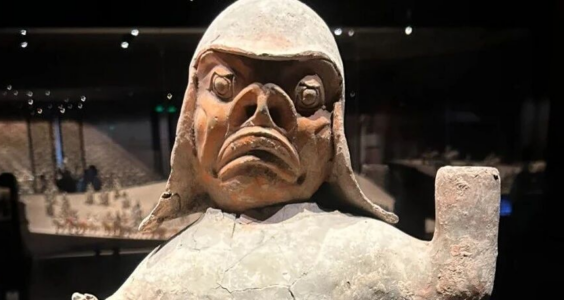
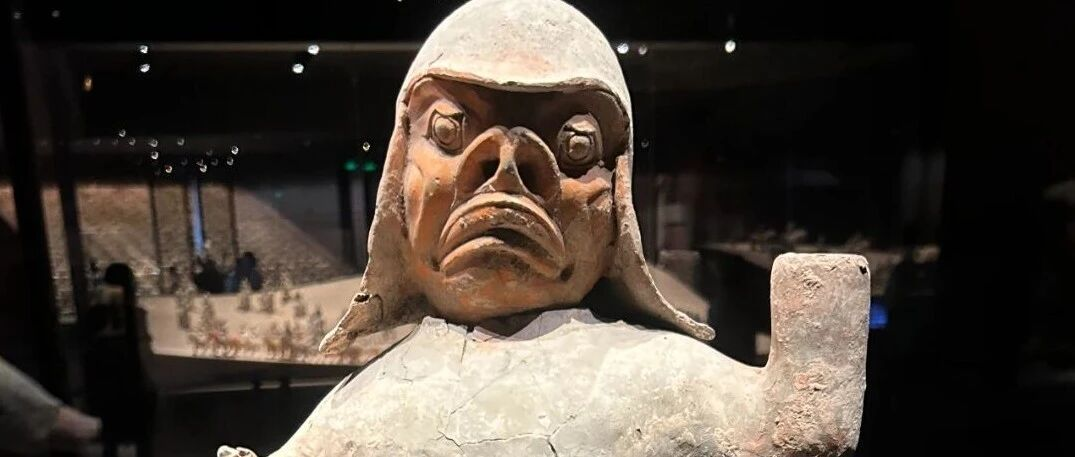
胡思乱想,不一定对。
一
读徐贲《东德的思想宣传》。内中提到东德全部人口不过1650万,其中竟有80多万“宣传工作者”,占到了总人口的5%。相当于每20名东德人当中就有一位“洗脑者”,其统治成本之高可见一斑。这不但意味着大量民众创造的财富被用于压迫民众而非创造更多的社会财富,也意味着谎言必然成为东德人日常生活的重要组成部分。发展到后来,不但官场不能讲真话,社会不能讲真话,连宣传机器的谎言也没办法正常运转——事件发生后,所有撒谎者都要等上级指示。若无上级指示来统一谎言口径,再小的社会问题,也有可能让统治机器陷入自相矛盾、难以自圆其说的窘境。
二
索隐派流行,根本原因是社会缺乏正常表达的空间。人们默认作者不能正常说真话,作者的真实思想真实情感只能通过非常隐晦的方式传递。细读过《红楼梦》的人,大概率不会相信“《红楼梦》是悼明之作”,毕竟其内容深度远不是“悼明”两字可以概括。人们愿意相信“《红楼梦》是悼明之作”,一方面是因为思维缺乏逻辑训练,另一方面也是因为清帝国(尤其是康雍乾时代)确确实实是个不允许民众自由表达的时代。所有诞生于不允许自由表达时代的作品,都有可能在后世遭遇被“索隐”的命运,《红楼梦》不是个案。
三
我觉得在2025年讨论某某朝代是不是“中华正统”挺无聊的,会让人的脑子整个散发出一种古老而腐朽的气息。要知道,所谓“正统”不过是古代统治者自诩“天命所归”的政治表达。与其接过作古帝王的旧命题继续讨论谁是“中华正统”,不如比较一下哪些历史时段里底层百姓活得更接近于人(等于人那是奢望,是不存在的)。
古代知识分子笔下的“华夷之辩”,也与民族主义无关,比较的是文明程度,即谁才是真正的“礼仪之邦”。用今天的话来讲,就是谁的政治更文明,谁的文化更繁荣,谁的经济更发达,谁的社会更自由。可惜的是,这套叙事后来也被皇帝们抢夺了过去,用来给“政权正统性”背书(清帝国尤其爱用)。为了让背书生效,又捏造了许多自我夸耀的虚假信息。结果就是当历史进入晚清,许多读书人的脑子已经坏掉了,他们拒绝承认外部世界也存在文明,甚至拒绝承认外部世界存在“人”。备好了棺材去痛骂恭亲王、反对开设同文馆的杨廷熙,就认定洋人只是“犬羊”,向“犬羊”学习天文、数学知识绝对不可接受。醇亲王奕譞、江浙名士李慈铭这些人,也一度持同样的看法。
四
读美国汉学家彭慕兰的《清朝之迷:有限的财政收入如何维持长期统治》一文。内中说:“清政府在地方社会的存在感其实相当有限,绝大多数清朝的老百姓一辈子都不曾与一位领有俸禄的官员打过交道”;又说“清代的法律制度无疑具有威权性质,但从整体而言却维护了私人产权”;还说“清朝的统治者在长达一百五十余年的时间里,始终满足于有限的财政收入”,且“清朝在有限的财政收入内,在有些事务上却有出色的表现,例如在荒歉岁月保护民生方面……”
这些论断都相当可疑。比如第一句话就很扯淡。清代官员总数(即所谓“领有俸禄的官员”)不过两三万人,与四万万人口相比自然是少数,说“绝大多数清朝的老百姓一辈子都不曾与一位领有俸禄的官员打过交道”没问题,可据此认定“清政府在地方社会的存在感其实相当有限”那就属于胡说八道。要知道,在这些“领有俸禄的官员”之外,还存在规模庞大的胥吏群体,他们有足够的能力让“地方社会”领教“清政府的存在感”(不理解的人,可以想想C管)。距离容易产生美,海外汉学家做中国史研究,常被古代官方资料蒙蔽,于是有人赞美隋炀帝,有人闹着要给宋徽宗翻案,又有人盛赞清帝国的治理实在棒,颇有些类似当年伏尔泰赞颂康熙皇帝是“哲人王”。
五
观历史教材七年级上册(2016年出版),提到汉武帝的盐铁官营政策时说:“还在全国各地设盐铁官,把煮盐、冶铁等经营权收归国有,实行盐铁官营、专卖;……这些措施,使国家的财政状况有了很大改善,为汉武帝许多政策的推行奠定了经济基础。”
全篇无一字提及盐铁官营之后百姓承受的苦难。食盐里都是沙子,铁制农具质量直线下滑,且盐铁价格远高于以前,整个社会退回到了吃草梗用木石农具的地步。当然也无一字提及汉武帝的“许多政策”最终造就了“天下户口减半”的结局,简言之就是没有具体的“人”。所以我经常跟大猫说,这样的历史教材你随便看看就好,不必当真;也不用在意考试成绩,能及格就挺好,不及格也无所谓。相比考试成绩,保卫自己的大脑是更重要的事情。